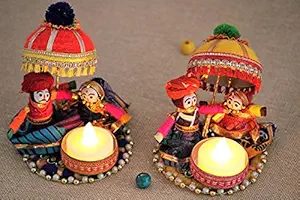अब रघुपति पद पंकरुह हियँ धरि पाइ प्रसाद।
कहउँ जुगल मुनिबर्य कर मिलन सुभग संबाद ॥43 ख॥
मैं अब श्री रघुनाथजी के चरण कमलों को हृदय में धारण कर और उनका प्रसाद पाकर दोनों श्रेष्ठ मुनियों के मिलन का सुंदर संवाद वर्णन करता हूँ॥43 (ख)॥
चौपाई :
भरद्वाज मुनि बसहिं प्रयागा। तिन्हहि राम पद अति अनुरागा॥
तापस सम दम दया निधाना। परमारथ पथ परम सुजाना॥1॥
भरद्वाज मुनि प्रयाग में बसते हैं, उनका श्री रामजी के चरणों में अत्यंत प्रेम है। वे तपस्वी, निगृहीत चित्त, जितेन्द्रिय, दया के निधान और परमार्थ के मार्ग में बड़े ही चतुर हैं॥1॥
माघ मकरगत रबि जब होई। तीरथपतिहिं आव सब कोई॥
देव दनुज किंनर नर श्रेनीं। सादर मज्जहिं सकल त्रिबेनीं॥2॥
माघ में जब सूर्य मकर राशि पर जाते हैं, तब सब लोग तीर्थराज प्रयाग को आते हैं। देवता, दैत्य, किन्नर और मनुष्यों के समूह सब आदरपूर्वक त्रिवेणी में स्नान करते हैं॥।2॥
पूजहिं माधव पद जलजाता। परसि अखय बटु हरषहिं गाता॥
भरद्वाज आश्रम अति पावन। परम रम्य मुनिबर मन भावन॥3॥
श्री वेणीमाधवजी के चरणकमलों को पूजते हैं और अक्षयवट का स्पर्श कर उनके शरीर पुलकित होते हैं। भरद्वाजजी का आश्रम बहुत ही पवित्र, परम रमणीय और श्रेष्ठ मुनियों के मन को भाने वाला है॥3॥
तहाँ होइ मुनि रिषय समाजा। जाहिं जे मज्जन तीरथराजा॥
मज्जहिं प्रात समेत उछाहा। कहहिं परसपर हरि गुन गाहा॥4॥
तीर्थराज प्रयाग में जो स्नान करने जाते हैं, उन ऋषि-मुनियों का समाज वहाँ (भरद्वाज के आश्रम में) जुटता है। प्रातःकाल सब उत्साहपूर्वक स्नान करते हैं और फिर परस्पर भगवान् के गुणों की कथाएँ कहते हैं॥4॥
दोहा :
ब्रह्म निरूपन धरम बिधि बरनहिं तत्त्व बिभाग।
ककहिं भगति भगवंत कै संजुत ग्यान बिराग॥44॥
ब्रह्म का निरूपण, धर्म का विधान और तत्त्वों के विभाग का वर्णन करते हैं तथा ज्ञान-वैराग्य से युक्त भगवान् की भक्ति का कथन करते हैं॥44॥
चौपाई :
एहि प्रकार भरि माघ नहाहीं। पुनि सब निज निज आश्रम जाहीं॥
प्रति संबत अति होइ अनंदा। मकर मज्जि गवनहिं मुनिबृंदा॥1॥
इसी प्रकार माघ के महीनेभर स्नान करते हैं और फिर सब अपने-अपने आश्रमों को चले जाते हैं। हर साल वहाँ इसी तरह बड़ा आनंद होता है। मकर में स्नान करके मुनिगण चले जाते हैं॥1॥
एक बार भरि मकर नहाए। सब मुनीस आश्रमन्ह सिधाए॥
जागबलिक मुनि परम बिबेकी। भरद्वाज राखे पद टेकी॥2॥
एक बार पूरे मकरभर स्नान करके सब मुनीश्वर अपने-अपने आश्रमों को लौट गए। परम ज्ञानी याज्ञवल्क्य मुनि को चरण पकड़कर भरद्वाजजी ने रख लिया॥2॥
सादर चरन सरोज पखारे। अति पुनीत आसन बैठारे॥
करि पूजा मुनि सुजसु बखानी। बोले अति पुनीत मृदु बानी॥3॥
आदरपूर्वक उनके चरण कमल धोए और बड़े ही पवित्र आसन पर उन्हें बैठाया। पूजा करके मुनि याज्ञवल्क्यजी के सुयश का वर्णन किया और फिर अत्यंत पवित्र और कोमल वाणी से बोले-॥3॥
नाथ एक संसउ बड़ मोरें। करगत बेदतत्त्व सबु तोरें॥
कहत सो मोहि लागत भय लाजा। जौं न कहउँ बड़ होइ अकाजा॥4॥
हे नाथ! मेरे मन में एक बड़ा संदेह है, वेदों का तत्त्व सब आपकी मुट्ठी में है (अर्थात् आप ही वेद का तत्त्व जानने वाले होने के कारण मेरा संदेह निवारण कर सकते हैं) पर उस संदेह को कहते मुझे भय और लाज आती है (भय इसलिए कि कहीं आप यह न समझें कि मेरी परीक्षा ले रहा है, लाज इसलिए कि इतनी आयु बीत गई, अब तक ज्ञान न हुआ) और यदि नहीं कहता तो बड़ी हानि होती है (क्योंकि अज्ञानी बना रहता हूँ)॥4॥
दोहा :
संत कहहिं असि नीति प्रभु श्रुति पुरान मुनि गाव।
होइ न बिमल बिबेक उर गुर सन किएँ दुराव॥45॥
हे प्रभो! संत लोग ऐसी नीति कहते हैं और वेद, पुराण तथा मुनिजन भी यही बतलाते हैं कि गुरु के साथ छिपाव करने से हृदय में निर्मल ज्ञान नहीं होता॥45॥
चौपाई :
अस बिचारि प्रगटउँ निज मोहू। हरहु नाथ करि जन पर छोहू॥
राम नाम कर अमित प्रभावा। संत पुरान उपनिषद गावा॥1॥
यही सोचकर मैं अपना अज्ञान प्रकट करता हूँ। हे नाथ! सेवक पर कृपा करके इस अज्ञान का नाश कीजिए। संतों, पुराणों और उपनिषदों ने राम नाम के असीम प्रभाव का गान किया है॥1॥
संतत जपत संभु अबिनासी। सिव भगवान ग्यान गुन रासी॥
आकर चारि जीव जग अहहीं। कासीं मरत परम पद लहहीं॥2॥
कल्याण स्वरूप, ज्ञान और गुणों की राशि, अविनाशी भगवान् शम्भु निरंतर राम नाम का जप करते रहते हैं। संसार में चार जाति के जीव हैं, काशी में मरने से सभी परम पद को प्राप्त करते हैं॥2॥
सोपि राम महिमा मुनिराया। सिव उपदेसु करत करि दाया॥
रामु कवन प्रभु पूछउँ तोही। कहिअ बुझाइ कृपानिधि मोही॥3॥
हे मुनिराज! वह भी राम (नाम) की ही महिमा है, क्योंकि शिवजी महाराज दया करके (काशी में मरने वाले जीव को) राम नाम का ही उपदेश करते हैं (इसी से उनको परम पद मिलता है)। हे प्रभो! मैं आपसे पूछता हूँ कि वे राम कौन हैं? हे कृपानिधान! मुझे समझाकर कहिए॥3॥
एक राम अवधेस कुमारा। तिन्ह कर चरित बिदित संसारा॥
नारि बिरहँ दुखु लहेउ अपारा। भयउ रोषु रन रावनु मारा॥4॥
एक राम तो अवध नरेश दशरथजी के कुमार हैं, उनका चरित्र सारा संसार जानता है। उन्होंने स्त्री के विरह में अपार दुःख उठाया और क्रोध आने पर युद्ध में रावण को मार डाला॥4॥
दोहा :
प्रभु सोइ राम कि अपर कोउ जाहि जपत त्रिपुरारि।
सत्यधाम सर्बग्य तुम्ह कहहु बिबेकु बिचारि॥46॥
हे प्रभो! वही राम हैं या और कोई दूसरे हैं, जिनको शिवजी जपते हैं? आप सत्य के धाम हैं और सब कुछ जानते हैं, ज्ञान विचार कर कहिए॥46॥
जैसें मिटै मोर भ्रम भारी। कहहु सो कथा नाथ बिस्तारी॥
जागबलिक बोले मुसुकाई। तुम्हहि बिदित रघुपति प्रभुताई॥1॥
हे नाथ! जिस प्रकार से मेरा यह भारी भ्रम मिट जाए, आप वही कथा विस्तारपूर्वक कहिए। इस पर याज्ञवल्क्यजी मुस्कुराकर बोले, श्री रघुनाथजी की प्रभुता को तुम जानते हो॥1॥
रामभगत तुम्ह मन क्रम बानी। चतुराई तुम्हारि मैं जानी॥
चाहहु सुनै राम गुन गूढ़ा कीन्हिहु प्रस्न मनहुँ अति मूढ़ा॥2॥
तुम मन, वचन और कर्म से श्री रामजी के भक्त हो। तुम्हारी चतुराई को मैं जान गया। तुम श्री रामजी के रहस्यमय गुणों को सुनना चाहते हो, इसी से तुमने ऐसा प्रश्न किया है मानो बड़े ही मूढ़ हो॥2॥
तात सुनहु सादर मनु लाई। कहउँ राम कै कथा सुहाई॥
महामोहु महिषेसु बिसाला। रामकथा कालिका कराला॥3॥
हे तात! तुम आदरपूर्वक मन लगाकर सुनो, मैं श्री रामजी की सुंदर कथा कहता हूँ। बड़ा भारी अज्ञान विशाल महिषासुर है और श्री रामजी की कथा (उसे नष्ट कर देने वाली) भयंकर कालीजी हैं॥3॥
Introduction to the Dialogue
Overview of Yajnavalkya and Bharadwaj
The dialogue between Yajnavalkya and Bharadwaj highlights spiritual wisdom and philosophical insights for seekers.
Historical Context
This conversation is rooted in Vedic traditions reflecting the importance of knowledge exchange in ancient India.
Spiritual Relevance
The dialogue emphasizes ethical living meditation and understanding of dharma for personal growth.
Key Philosophical Teachings
Yajnavalkya shares insights on the nature of the soul duties and the path to liberation.
Impact on Devotees
Understanding this dialogue helps devotees cultivate wisdom mindfulness and devotion.
Prayag Mahatmya
Significance of Prayag
Prayag is celebrated as a sacred confluence of rivers enhancing spiritual merit and devotion.
Ritual Importance
Holy rituals performed at Prayag purify the mind and soul amplifying spiritual experiences.
Historical Significance
Prayag has been a center for Vedic learning and spiritual discourse since ancient times.
Influence on Pilgrims
Pilgrims gain insight peace and spiritual upliftment by visiting Prayag and participating in sacred events.
Legends and Stories
Many legends associate Prayag with divine blessings and spiritual transformation for devotees.
Key Teachings of the Dialogue
Moral and Ethical Guidance
Yajnavalkya teaches the importance of truth righteousness and duty in daily life.
Understanding Dharma
Dharma is highlighted as a guiding principle for living a balanced and spiritually aware life.
Path to Liberation
Devotees are guided on self-discipline knowledge and devotion as essential steps toward liberation.
Role of Knowledge
Knowledge and discernment are emphasized as tools to overcome ignorance and attain spiritual wisdom.
Impact on Spiritual Growth
Following these teachings enriches spiritual understanding and strengthens inner peace.
Practical Lessons for Devotees
Applying Wisdom in Daily Life
Devotees can incorporate the dialogue’s teachings to make ethical decisions and maintain mental clarity.
Devotion and Meditation
Meditative practices enhance understanding of the self and foster connection with the divine.
Guidance on Conduct
Following the ethical guidance from the dialogue ensures harmony in personal and community life.
Self-Discipline Techniques
Devotees are encouraged to cultivate patience focus and mindfulness to strengthen spiritual practice.
Spiritual Rewards
Implementing these lessons leads to inner peace wisdom and devotion towards God.
Conclusion and Reflections
Significance for Modern Devotees
The dialogue continues to inspire ethical spiritual and devotional practices even today.
Enduring Teachings
The wisdom shared by Yajnavalkya and Bharadwaj remains relevant for guiding personal and spiritual growth.
Integration in Life
Devotees are encouraged to integrate the dialogue’s lessons into daily actions and decisions.
Inspiration for Devotees
The conversation inspires devotion mindfulness and ethical living for spiritual upliftment.
Final Thoughts
Understanding and reflecting upon this dialogue enhances clarity peace and spiritual awareness.
The dialogue between Yajnavalkya and Bharadwaj highlights spiritual wisdom and philosophical insights for seekers.
This conversation is rooted in Vedic traditions reflecting the importance of knowledge exchange in ancient India.
The dialogue emphasizes ethical living meditation and understanding of dharma for personal growth.
Yajnavalkya shares insights on the nature of the soul duties and the path to liberation.
Understanding this dialogue helps devotees cultivate wisdom mindfulness and devotion.
Prayag is celebrated as a sacred confluence of rivers enhancing spiritual merit and devotion.
Holy rituals performed at Prayag purify the mind and soul amplifying spiritual experiences.
Prayag has been a center for Vedic learning and spiritual discourse since ancient times.
Pilgrims gain insight peace and spiritual upliftment by visiting Prayag and participating in sacred events.
Many legends associate Prayag with divine blessings and spiritual transformation for devotees.
Yajnavalkya teaches the importance of truth righteousness and duty in daily life.
Dharma is highlighted as a guiding principle for living a balanced and spiritually aware life.
Devotees are guided on self-discipline knowledge and devotion as essential steps toward liberation.
Knowledge and discernment are emphasized as tools to overcome ignorance and attain spiritual wisdom.
Following these teachings enriches spiritual understanding and strengthens inner peace.
Devotees can incorporate the dialogue’s teachings to make ethical decisions and maintain mental clarity.
Meditative practices enhance understanding of the self and foster connection with the divine.
Following the ethical guidance from the dialogue ensures harmony in personal and community life.
Devotees are encouraged to cultivate patience focus and mindfulness to strengthen spiritual practice.
Implementing these lessons leads to inner peace wisdom and devotion towards God.
The dialogue continues to inspire ethical spiritual and devotional practices even today.
The wisdom shared by Yajnavalkya and Bharadwaj remains relevant for guiding personal and spiritual growth.
Devotees are encouraged to integrate the dialogue’s lessons into daily actions and decisions.
The conversation inspires devotion mindfulness and ethical living for spiritual upliftment.
Understanding and reflecting upon this dialogue enhances clarity peace and spiritual awareness.

राजस्थानी राजा-रानी कठपुतली, गुड़िया सजावटी टी-लाइट कैंडल होल्डर
Buy Now
Mahabharata Comic Book Collection – 42 Illustrated Stories in 3 Volumes | Indian Epics, Mythology & Legends | Stories of Krishna, Arjuna, Draupadi & More | Amar Chitra Katha
Buy Now